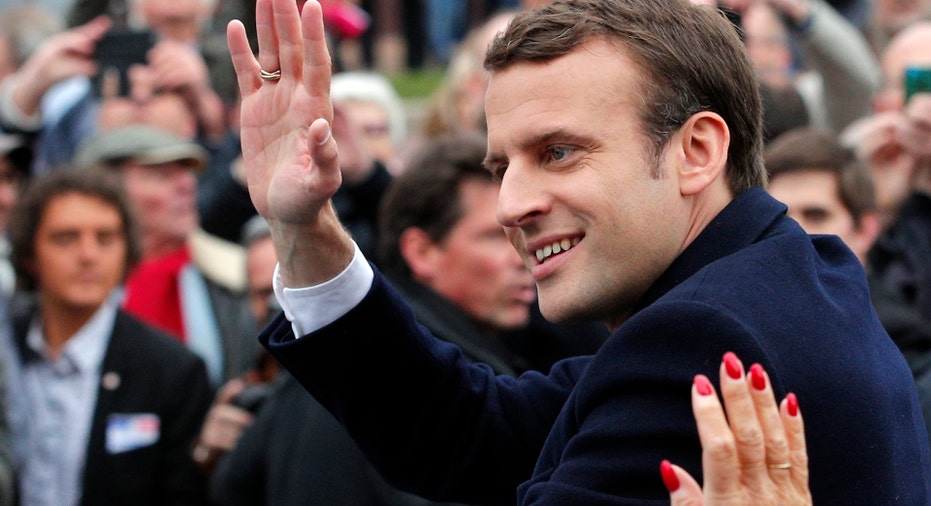Popularity of France's upstart new president fading fast

PARIS (AP) — Emmanuel Macron's honeymoon didn't last long.
Less than three months after his election, France's energetic and image-conscious president has seen his popularity drop after announcing budget cuts, launching a divisive labor reform and engaging in a damaging dispute with the military.
A series of opinion polls last week showed the percentage of French citizens who said they were satisfied with Macron's policies and trusted their young leader to deal with the country's problems plunging. The reversal might not affect the visible international profile he has cut since taking office, but it could hurt Macron's ability to secure his ambitious domestic agenda.
France's Ifop polling agency put it bluntly: "Apart from Jacques Chirac in July 1995, a newly elected president has never seen his popularity rate falling as quickly during the summer after the election."
Four polls over the past week showed Macron's support down sharply from earlier surveys, though each one measured popularity differently. The polls by Ifop, Harris Interactive, YouGov and Elabe showed between 36 and 54 percent of respondents with positive views of Macron's presidency, a decline from previous gauges of public opinion that also had shown his approval ratings down since he won 66 percent of the vote in the May election.
His declining approval is striking given that Macron was being credited two months ago with giving France a boost of much-needed confidence after years of security fears and economic stagnation. Increasingly, he instead is portrayed as power-hungry and inexperienced.
The French media have started calling Macron "Jupiter," a reference to the mythological king of the Roman gods and what is perceived as the president's superior attitude after he upended France's political landscape and shot from relative obscurity to the nation's top post at age 39.
While struggling at home, Macron has succeeded in raising France's diplomatic profile, hosting meetings with Russian President Vladimir Putin and President Donald Trump and Libyan peace talks in Paris.
Jean-Daniel Levy, director of the Policy and Opinion Department at the Harris Interactive polling institute, connects the president's popularity slide to the government's plans to reduce housing aid for students and to initiate tax reform. The reform aims to help lower-income employees, but could weigh on retirees.
Macron's image also took a hit during his standoff with the French military chief over budget cuts. Gen. Pierre De Villiers resigned and was quickly replaced, but some saw last month's public dispute as evidence of the president's authoritarian tendencies.
Macron has promised to boost defense spending to 2 percent of gross domestic product by 2025 as part of France's commitments to NATO, but the government announced a reduction of 870 million euros in military spending for this year.
The government also launched the labor reforms that were central to Macron's campaign promise to boost France's lagging economy through pro-free market policies. Changes would include capping the potential financial penalties for companies sued for firing employees and giving businesses greater leeway to set workplace rules instead of relying on collective bargaining agreements.
Labor unions and France's far-left parties are fighting the reforms, saying they would weaken hard-won worker protections. Critics also resent the way Macron is trying to speed their approval. The government is invoking a special procedure to avoid a lengthy debate in parliament.
Daniel Fasquelle, a lawmaker from the conservative The Republicans party denounced Macron for what he called the "will to weaken all opposition" and for refusing to give interviews. Except for carefully choreographed photo opportunities, the president has distanced himself from the media. He canceled the traditional Bastille Day television interview.
"These are excesses the French judge more harshly and they are right," Fasquelle said on France's Info radio. "It simply means the president is not up to the task... He's paying for his own lack of experience. Maybe he got too quickly, too soon, high responsibilities that are overwhelming him."
Macron has repeatedly warned that his promised spending cuts and labor reforms would be difficult at first and hinted that critics are just scared of change. Presidential aides refused to comment on last week's poll numbers as they had done during Macron's election campaign.
Government spokesman Christophe Castaner acknowledged that Macron has been standoffish with the press, but offered an alternative explanation to inexperience or overwhelm.
"No one can blame him (Macron) for rarely speaking," Castaner told reporters. "I understand it can irritate a bit. I understand it can be questioned. But I think you and I should get used to it because the president has decided not to be a commentator (of the news), but an actor."
Macron is expected to return from his August vacation to a tough September, with unions and far-left parties calling for street protests against his proposed labor reforms.



















